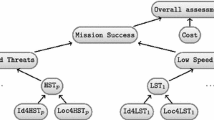Abstract
In multi-criteria decision-making problems, ordinal data themselves provide a convenient instrument for articulating preferences but they impose some difficulty on the aggregation process since ambiguity prevails in the preference structure inherent in the ordinal data. One of the key concerns in the aggregation of ordinal data is to differentiate among the rank positions by reflecting decision-maker’s preferences. Since individual attitude is fairly different, it is presumable that each ranking position has different importance. In other words, the quantification schemes among the rank positions could vary depending on the individual preference structure. We find that, among others, the ordered weighted averaging (OWA) operator can help to take this concept into effect on several reasons. First, the OWA operator provides a means to take into account a discriminating factor by introducing the measure of attitudinal character. Second, it can produce appropriate ranking weights corresponding to each rank position by solving a mathematical program subject to the constraint of attitudinal character. To better understand the attitudinal character playing a role as a discriminating factor, we develop centered ranking weights from ordinal weak relations among the ranking positions and then investigate their properties to relate them with the OWA operator weights having the maximum entropy. Finally, we present a method for generating the OWA operator weights via rank-based weighting functions.

Similar content being viewed by others
References
Ahn, B. S. (2006). On the properties of OWA operator weights functions with constant level of orness. IEEE Transactions on Fuzzy Systems, 14, 511–515.
Alonso, S., Herrera-Viedma, E., Chiclana, F., & Herrera, F. (2010). A web-based consensus support system for group decision making problems and incomplete preferences. Information Sciences, 180, 4477–4495.
Barron, F. H., & Barret, B. E. (1996). Decision quality using ranked attribute weights. Management Science, 42, 1515–1523.
Chiclana, F., Herrera, F., & Herrera-Viedma, E. (1998). Integrating three representation models in fuzzy multipurpose decision making based on fuzzy preference relations. Fuzzy Sets and Systems, 97, 33–48.
Chiclana, F., Herrera-Viedma, E., Herrera, F., & Alonso, S. (2007). Some induced ordered weighted averaging operators and their use for solving group decision-making problems based on fuzzy preference relations. European Journal of Operational Research, 97, 383–399.
Choi, D. H., Ahn, B. S., & Kim, S. H. (2007). Multicriteria group decision making under incomplete preference judgments: using fuzzy logic with a linguistic quantifier. International Journal of Intelligent Systems, 22, 641–658.
Cook, W. D., & Seiford, L. M. (1978). Priority ranking and consensus formation. Management Science, 24, 1721–1732.
Filev, D., & Yager, R. R. (1995). Analytic properties of maximum entropy OWA operators. Information Sciences, 85, 11–27.
Herrera-Viedma, E., Alonso, S., Chiclana, F., & Herrera, F. (2007). A consensus model for group decision making with incomplete fuzzy preference relations. IEEE Transactions on Fuzzy Systems, 15, 863–877.
Lansdowne, Z. F. (1996). Ordinal ranking methods for multicriteria decision making. Naval Research Logistics, 43, 613–627.
Merigó, J. M., Gil-Lafuente, A. M., Zhou, L. G., & Chen, H. Y. (2010). Induced and linguistic generalized aggregation operators and their application in linguistic group decision making. Group Decision and Negotiation. doi:10.1007/s10726-010-9225-3.
O’Hagan, M. (1990). A fuzzy neuron based on maximum entropy ordered weighted averaging. In Proc. 24th ann. Asilomar conf. on signals systems computers (pp. 618–623). Pacific Grove: IEEE and Maple Press.
Pomerol, J. C., & Romero, S. B. (2000). Multicriterion decision in management: principles and practice. Dordrecht: Kluwer Academic.
Puerto, J., Marmol, A. M., Monloy, L., & Fernandez, F. R. (2000). Decision criteria with partial information. International Transactions in Operational Research, 7, 51–65.
Saaty, T. S. (1980). The analytic hierarchy process. New York: McGraw-Hill.
Stillwell, W. G., Seaver, D. A., & Edwards, W. (1981). A comparison of weight approximation techniques in multiattribute utility decision making. Organizational Behavior and Human Decision Processes, 28, 62–77.
Tanino, T. (1990). On group decision making under fuzzy preferences. In J. Kacprzyk & M. Fedrizzi (Eds.), Multiperson decision making using fuzzy sets and possibility theory (pp. 172–185). Norwell: Kluwer Academic.
Yager, R. R. (1988). On ordered weighted averaging aggregation operators in multicriteria decision making. IEEE Transactions on Systems, Man and Cybernetics, 18, 183–190.
Yager, R. R. (1993). Non-numeric multi-criteria multi-person decision making. Group Decision and Negotiation, 2, 81–93.
Yager, R. R. (1996). Quantifier guided aggregation using OWA operators. International Journal of Intelligent Systems, 11, 49–73.
Yager, R. R. (2007). Aggregation of ordinal information. Fuzzy Optimization and Decision Making, 6, 199–219.
Yager, R. R., & Filev, D. P. (1999). Induced ordered weighted averaging operators. IEEE Transactions on Systems, Man and Cybernetics. Part B, 29, 141–150.
Xu, Z. S. (2004). Goal programming models for obtaining the priority vector of incomplete fuzzy preference relation. International Journal of Approximate Reasoning, 36, 261–270.
Acknowledgements
The authors wish to express our appreciation to anonymous reviewers for their helpful comments on an earlier manuscript. The author (Byeong Seok Ahn) also would like to express deep appreciation to Young Soon Kwak for her helpful assistance.
Author information
Authors and Affiliations
Corresponding author
Rights and permissions
About this article
Cite this article
Ahn, B.S., Choi, S.H. Aggregation of ordinal data using ordered weighted averaging operator weights. Ann Oper Res 201, 1–16 (2012). https://doi.org/10.1007/s10479-012-1169-3
Published:
Issue Date:
DOI: https://doi.org/10.1007/s10479-012-1169-3




